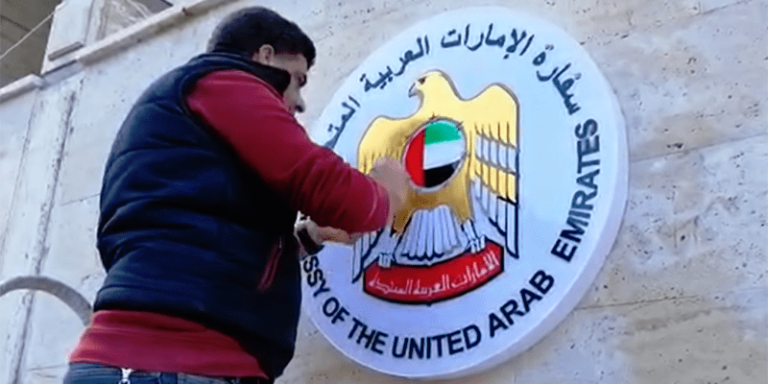
Some Arab leaders have recently made efforts to show goodwill toward the Syrian regime by restoring political and diplomatic relations with Damascus. This is paradoxical because several had previously openly taken a tough stance on the Assad regime and its crimes against the Syrian people since the Syrian revolution started in 2011. Some of them even supported the Syrian opposition, politically and/or militarily.
Today, after Syrian President Bashar al-Assad has managed to exert his authority over most Syrian areas that had previously been under the control of the Syrian armed opposition, especially in Aleppo, Eastern Ghouta, Qalamoun, and other areas, he feels that he has regained his legitimacy militarily and must therefore work to restore it politically. Assad will only be able to fulfill his goal with Arab cooperation as it is impossible, at least for the time being, to achieve this only with western support, be it European or American.
Role of the League of Arab States
In the course of its history, the League of Arab States has suspended the membership of a number of Arab countries. The most famous case in this context was Egypt’s after the conclusion of its peace treaty with Israel in 1979. Hence, the suspension of Syria’s membership on November 16, 2011 was not novel, and especially after doing the same with Libya at the start of the Arab Spring on February 22, 2011. The case for the suspension of Syria and Libya was based on the extreme violence the regimes of the two countries committed against their peoples after the peaceful demonstrations in 2011, which demanded enacting radical political reforms to the political system, including the right to change and elect the president.
The case for the suspension of Syria and Libya was based on the extreme violence the regimes of the two countries committed against their peoples after the peaceful demonstrations in 2011.
In 2011, the Gulf Cooperation Council (GCC) was cohesive and politically stable and it had the necessary financial resources to influence the direction and decisions of the Arab League. Accordingly, the GCC succeeded in suspending the membership of the Syrian and Libyan regimes. After Saudi Arabia, the United Arab Emirates, and Bahrain imposed a blockade on Qatar in June 2017, the GCC disintegrated and its security system collapsed. Gulf countries began forming alliances based on their own interests without regard to the concept of collective security essential for the alliance. It is therefore not surprising that the common position the GCC reached regarding the Assad regime has collapsed.
After the June 30, 2013 coup in Egypt, Saudi Arabia, the UAE, and Bahrain played a key role in publicly supporting Egyptian President Abdel-Fattah e-Sisi politically and financially. However, Qatar disagreed with this stand. It had supported President Mohammed Morsi after his election in 2012 and provided aid to his government. Saudi Arabia and the UAE considered the fight against the Muslim Brotherhood as one of the most important pillars of their foreign policy, so they included it on their lists of terrorist organizations. The UAE remained cautious about portraying the war in Syria as one of extremist terrorists versus a legitimate political system, which is what Russia has claimed. Russia’s military intervention in September 2015 played a decisive role in Assad’s victory over the opposition. However, this victory had a heavy cost, as it claimed the lives of hundreds of thousands, drove millions of Syrians to become internally displaced persons and refugees, and destroyed the country’s infrastructure, including hospitals, school buildings, and private property.
After the June 30, 2013 coup in Egypt, Saudi Arabia, the UAE, and Bahrain played a key role in publicly supporting Egyptian President Abdel-Fattah e-Sisi politically and financially. However, Qatar disagreed with this stand.
It seemed as if a new Arab axis had been formed in 2015 based on the position of the Arab states toward the Arab Spring revolutions, which most of the Arab regimes considered merely as conspiracies aimed at overthrowing and threatening the ruling regimes—rather than as a chance to strengthen the legitimacy of the Arab state and an opportunity to inject new blood into its fossilized political institutions. It was natural that many Arab regimes—among them Algeria, Iraq, and Lebanon—maintained relations with Assad even during the years of war as well as in the worst moments of his massacres and use of chemical weapons against the Syrian people. Iraq even supported the Assad regime on sectarian grounds, under pressure from Iran, and supplied it with weapons and militias that helped the regime regain control in areas where there was a shortage of pro-Syrian regime fighters.
Other states were waiting for the opportunity to announce a complete change in their political positions based on old reservations against the revolutions of the Arab Spring. This explains the sudden visit by Sudanese President Omar al-Bashir to Syria and his meeting with Assad, as well as Mauritania’s announcement of an imminent visit to Damascus by its president Mohammed Ould Abdel-Aziz. It also explains the decision of the UAE and Bahrain to open their embassies in Damascus and the visit of Ali Mamlouk—the Syrian intelligence chief accused of war crimes and crimes against humanity—to Cairo for meetings with Egyptian security officials. All these developments reveal that the axis that was opposed to the Arab Spring took the step of bringing Bashar al-Assad into its fold, after overcoming its hesitation because of Arab public opinion, which has been deeply outraged by the massacres committed by Assad against the Syrian people. The direct coverage of Arab television of the Syrian regime’s brutality sparked widespread outrage that made it difficult to absolve or rehabilitate Assad in Arab eyes. Indeed, Arab public opinion condemned Assad despite the absence of any Arab regional court and the lack of jurisdiction of the International Criminal Court to try and convict him.
How, then, should we understand these Arab states’ attempts to rehabilitate Assad?
The Collapse of Accountability and of the Justice System in the Arab world
The League of Arab States is one of the oldest regional organizations; it was created in 1945 before the founding of the United Nations itself. However, the state of its political development and evolution as a security and regional system is weak compared to similar regional organizations across the world. The League’s system of accountability and justice—as an indicator of the development of the principle of the rule of law in the region—is backward and rigid.
The European system of human rights was the fastest growing and developed after World War II. The Organization of American States was founded soon after, in 1948, and it was able to establish the Inter-American Court of Human Rights. The last to be established was the African Union, which in 2008 formed a special tribunal within the African human and peoples’ rights system under the name of the African Court on Human and Peoples’ Rights. This court has been able, for example, to try the former president of Chad, Hissène Habré, on charges of war crimes, crimes against humanity, and torture.
The Arab legal system continued to reflect the predominant role of the law practiced by Arab governments, where the judiciary is not independent and legal institutions are fully subordinated to the executive branch, which employs law enforcement institutions for political purposes.
The Arab legal system continued to reflect the predominant role of the law practiced by Arab governments, where the judiciary is not independent and legal institutions are fully subordinated to the executive branch, which employs law enforcement institutions for political purposes. Even Egypt, which has seen periods of independent development of the rule of law, has witnessed a deterioration of its legal system to an alarming level after Sisi took power in 2013 and the judiciary became a tool to suppress and punish political opponents. This is why it was impossible to formulate a legal position based on holding the Assad regime accountable, due to the absence of the necessary legal structure. Hence, Arab states started dealing with Assad as a military victor, in accordance with the principles of realpolitik, even though such an approach will clearly lead to a total collapse of the values of the rule of law and accountability and their role in Arab political life. As a result, many Arab countries began to consider restoring their relations with the Assad regime in accordance with the principle of realistic political considerations and in response to pressure exerted by Russia, which sees one of its political missions today as the rehabilitation of the Assad regime. This was further precipitated by the full US withdrawal not only from dealing with the Syrian conflict, but also from Syrian territory, as announced by President Donald Trump last December.
It can therefore be said that the rehabilitation of the Assad regime is a natural consequence of the collapse of the justice system in the Arab world. This system continues to be viewed as an optional ethical perspective and not as a prerequisite for the dignity of Arab people and their right to establish justice, equality, and the rule of law. When some voices call for the removal of morality from politics, they strip politics of its primary function: to serve the public and its interests. Therefore, we must look at Assad’s return to the Arab fold as an indication that the Arab system is incapable of restoring the meaning of values in public life and, above all, the principles of justice and human rights.
The Russian Role in Assad’s Rehabilitation
As the United States withdraws from the Middle East, Russia fills the resulting vacuum. This is not only because of the paramount importance of the region, but also because interstate relations within the Arab regional system have failed to develop. Building this system has depended on relations with international actors (as it was considered more important from a strategic and security standpoint) rather than by developing relationships with neighboring Arab states or the member states of the Arab system. Russia exploited the Syrian crisis to consolidate its role in the Arab world. It considered the rehabilitation of the Assad regime one of its political goals, especially since Moscow is closer to the axis that is hostile to the Arab Spring revolutions. Moscow viewed these revolutions as a window for rapprochement in Arab and western relations, as these relations would potentially be strengthened with the spread of democracy and pluralism in the Arab world. This, in turn, contradicts Russia’s longstanding goals of strengthening and supporting authoritarian regimes in the world. It also coincides with the United States abandoning its role in supporting the values of democracy and human rights during President Trump’s term.
As the United States withdraws from the Middle East, Russia fills the resulting vacuum. This is not only because of the paramount importance of the region, but also because interstate relations within the Arab regional system have failed to develop.
Governments seeking closer ties with Russia, such as those in Sudan and Mauritania, are competing with Assad to win Russian goodwill. Sudan aspires to obtain Russian protection in the UN Security Council against any possible condemnation, especially with Bashir’s status as wanted by the International Criminal Court. These countries may also be seeking further Russian aid after failing to develop a productive economy and becoming fully dependent on grants and international aid.
In the end, Assad’s return to the Arab fold was expected because of the inherent fragility of the Arab regional system and Russia’s expanding role. Those who supported the Arab Spring revolutions and their democratic goals should therefore focus on building regional bridges that restore balance to the values of dignity, freedom, and human rights.

